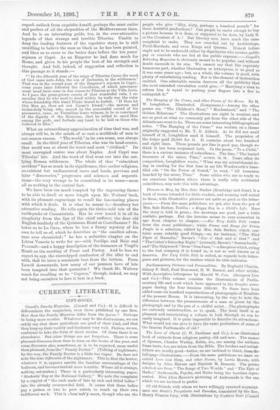CURRENT LITERATURE.
GIFT-BOOKS.
Cassell's Family Magazine. (Cassell and Co.)—It is difficult to differentiate the magazines, even those published by one firm. How does the Family Magazine differ from the Quiver P Perhaps in being more secular. Whatever may be the distinctions, we can safely say that those periodicals are good of their kind, and that they keep up their variety and freshness very well. Fiction, we see, continues to take the form of short stories. Of these there is an abundance. But other things are not forgotten. There is some pleasant discourse from time to time on the books of the year, and some discourse also, sometimes, as is to be expected, more useful than pleasant, from the "Family Doctor." (Talking of nightmare, by-the-way, the Family Doctor is a little too vague. He does not note the true differentia of the nightmare. This is, that the horror, whatever it is, appear amidst the familiar surroundings of the bedroom, and becomes tenfold more horrible. Where all is strange, nothing astonishes.) There is a particularly interesting paper, " Students' Day at the National Gallery." We note the complaint by a copyist of "the rush made of late by rich and titled ladies" into the already overcrowded field, It seems that these ladies pay a guinea or two to poor artists to touch up their own indifferent work. This is Ebonfnab'y mean, though who are the people who give " fifty, sixty, perhaps a hundred pounds " for these doubtful productions P Can people be snobs enough to buy a picture because it is done, or supposed to be done, by Lady B. or the Countess of A. ? But literary men have much the same complaint to make. They are crowded out by Archbishops, Field-Marshals, and even Kings and Queens. Honest toilers ought not to be undersold either by dignitaries who receive public pay or convicts who are fed at the public expense.—Cassell's Saturday Magazine is obviously meant to be popular, and without doubt succeeds in its aim. We cannot say that the expressly humorous part, whether illustration or letterpress, is as good as it was some years ago ; but, as a whole, the volume is good, with plenty of entertaining reading. Nor is the element of instruction omitted. One admirable maxim deserves all the publicity that the most extended circulation could give,—" Marrying a man to reform him is equal to putting your fingers into a fire to extinguish it."










































 Previous page
Previous page